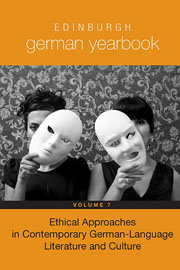13 results
6 - The Liminal Space of the Short Story: Clemens Meyer’s Die Nacht, die Lichter and Die stillen Trabanten
-
-
- Book:
- The Short Story in German in the Twenty-First Century
- Published by:
- Boydell & Brewer
- Published online:
- 09 February 2021
- Print publication:
- 15 December 2020, pp 118-136
-
- Chapter
- Export citation
Narrative Ethics and the Problems of Age and Aging in Annette Pehnt's Haus der Schildkröten
-
- Book:
- Edinburgh German Yearbook 7
- Published by:
- Boydell & Brewer
- Published online:
- 05 December 2013
- Print publication:
- 01 November 2013, pp 101-114
-
- Chapter
- Export citation
Shameful Stories: The Ethics of East German Memory Contests in Fiction by Julia Schoch, Stefan Moster, Antje Rávic Strubel, and Judith Schalansky
-
- Book:
- Edinburgh German Yearbook 7
- Published by:
- Boydell & Brewer
- Published online:
- 05 December 2013
- Print publication:
- 01 November 2013, pp 65-84
-
- Chapter
- Export citation
Frontmatter
-
- Book:
- Edinburgh German Yearbook 7
- Published by:
- Boydell & Brewer
- Published online:
- 05 December 2013
- Print publication:
- 01 November 2013, pp i-iv
-
- Chapter
- Export citation
Materiality and Ethics in Recent German Prose Narratives by Angelika Overath and Angela Krauß
-
- Book:
- Edinburgh German Yearbook 7
- Published by:
- Boydell & Brewer
- Published online:
- 05 December 2013
- Print publication:
- 01 November 2013, pp 47-64
-
- Chapter
- Export citation
Enlightenment Fundamentalism: Zafer Şenocak, Navid Kermani, and Multiculturalism in Germany Today
-
- Book:
- Edinburgh German Yearbook 7
- Published by:
- Boydell & Brewer
- Published online:
- 05 December 2013
- Print publication:
- 01 November 2013, pp 139-158
-
- Chapter
- Export citation
What the World Needs Now: Rancière, Ethology, and Christian Petzold's Toter Mann (2001) and Wolfsburg (2003)
-
- Book:
- Edinburgh German Yearbook 7
- Published by:
- Boydell & Brewer
- Published online:
- 05 December 2013
- Print publication:
- 01 November 2013, pp 29-46
-
- Chapter
- Export citation
“So ähnlich könnte es gewesen sein, aber […]”: Unethical Narrations of Emily Ruete's “Große Wandlungen”
-
- Book:
- Edinburgh German Yearbook 7
- Published by:
- Boydell & Brewer
- Published online:
- 05 December 2013
- Print publication:
- 01 November 2013, pp 115-138
-
- Chapter
- Export citation
Contents
-
- Book:
- Edinburgh German Yearbook 7
- Published by:
- Boydell & Brewer
- Published online:
- 05 December 2013
- Print publication:
- 01 November 2013, pp v-vi
-
- Chapter
- Export citation
Introduction: Ethical Approaches in Contemporary German-Language Literature and Culture
-
- Book:
- Edinburgh German Yearbook 7
- Published by:
- Boydell & Brewer
- Published online:
- 05 December 2013
- Print publication:
- 01 November 2013, pp 1-12
-
- Chapter
- Export citation

Edinburgh German Yearbook 7
- Ethical Approaches in Contemporary German-Language Literature and Culture
-
- Published by:
- Boydell & Brewer
- Published online:
- 05 December 2013
- Print publication:
- 01 November 2013
Affective Encounters and Ethical Responses in Robert Schneider's Die Luftgängerin and Sybille Berg's Vielen Dank für das Leben
-
- Book:
- Edinburgh German Yearbook 7
- Published by:
- Boydell & Brewer
- Published online:
- 05 December 2013
- Print publication:
- 01 November 2013, pp 85-100
-
- Chapter
- Export citation
8 - Matter Out of Place: Trash and Transition in Clemens Meyer’s Als wir träumten
-
-
- Book:
- Twenty Years On
- Published by:
- Boydell & Brewer
- Published online:
- 18 February 2023
- Print publication:
- 15 December 2011, pp 126-138
-
- Chapter
- Export citation

